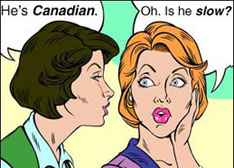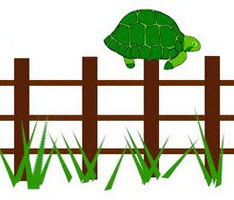Innovation is key to Canadian economic development .. and reviving colonized mind of British monarchy won’t help!
Sep 8th, 2011 | By Citizen X | Category: Canadian RepublicSometimes two headlines in the same newspaper on the same day can seem to explain each other. I had that feeling about two headlines in yesterday’s Toronto Star: “Lack of innovation holding Canada back: report” and “Tories order diplomats to hang portraits of the Queen by week’s end.”
The first article explained how: “Canada has fallen out of the Top 10 when it comes to global competitiveness, according to an annual ranking released Wednesday by the World Economic Forum … The report, which puts Canada down two spots to 12th place … said the country needs to be more innovative …”
I altogether agree with this critique. Whatever our other virtues (and we do have many good reasons to count our blessings), we have never been very “innovative” in Canada. A key question for us today is why not?
Marianne Mai, a ”dynamic corporate trainer” based in Singapore, posted an article on the innovation excellence website a few months ago that hints at what has always struck me as a subtle but important part of the answer. The article is called “Asia’s Changing Attitude To Innovation,” and it notes: “The average Asian operates in an environment that doesn’t … focus on innovation … Biting though this may sound, I’ll use the term Colonized Mind to describe this phenomenon …”

Who knows just what the lovely Ellen Page is opposing in this charming photograph? But it might be the British monarchy in Canada.
This same term – “colonized mind” – was used in the 1960s by the Quebec apostle of “sovereignty association,” René Lévesque, to characterize something about the traditional culture of the 1867 Canadian confederation he wanted to escape. And this brings me to my second Toronto Star headline from yesterday: “Tories order diplomats to hang portraits of the Queen by week’s end.”
Just why Stephen Harper, is trying to revive the traditional Canadian culture of the colonized mind in 2011 is beyond me. But I am quite sure it is not going to help the Canadian economy “be more innovative.” It is just another sign of what the historian Jack Granatsetin has called the “abject colonialism” of the Harper government’s policy on the smouldering embers of the British monarchy in Canada.
In a nutshell, colonial places do not innovate – economically as in other ways – because they feel that the leading action is always taking place somewhere else. Since the 1960s we had actually begun to make some progress on “decolonization” in the true north, strong and free. But it is not exactly an accident that “Canada has fallen out of the Top 10 when it comes to global competitiveness” during Mr. Harper’s tenure as prime minister.
As the Toronto Star article on the World Economic Forum report puts it: “the country has become complacent on competitiveness, relying instead on energy and natural resources and close trading ties to the giant US economy.”
 All this finally reminds me of the joke about Stephen Harper as a “post turtle” – an especially pointed version of which arrived in my email box this morning, compliments of an esteemed colleague who shares many of my political and economic views:
All this finally reminds me of the joke about Stephen Harper as a “post turtle” – an especially pointed version of which arrived in my email box this morning, compliments of an esteemed colleague who shares many of my political and economic views:
“While suturing a cut on the hand of a 75-year-old Alberta rancher, the doctor struck up a conversation. The topic soon got around to Stephen Harper and his role as our prime minister. The old rancher said, ‘Well, ya know, Harper is a post turtle.’ Not familiar with the term, the doctor asked ‘what’s that?’ The old rancher explained: ‘When you’re driving down a country road and you come across a fence post with a turtle balanced on top, that’s a post turtle.’
 “Seeing the puzzled look on the doctor’s face, the old rancher continued: ‘You know he didn’t get up there by himself, he doesn’t belong up there, he doesn’t know what to do while he’s up there, and he’s elevated beyond his ability to function. And you just wonder what kind of folks put him up there in the first place?’”
“Seeing the puzzled look on the doctor’s face, the old rancher continued: ‘You know he didn’t get up there by himself, he doesn’t belong up there, he doesn’t know what to do while he’s up there, and he’s elevated beyond his ability to function. And you just wonder what kind of folks put him up there in the first place?’”
(And, in our case, he’s still going to be up there for another four years! Wake me when it’s over.)




